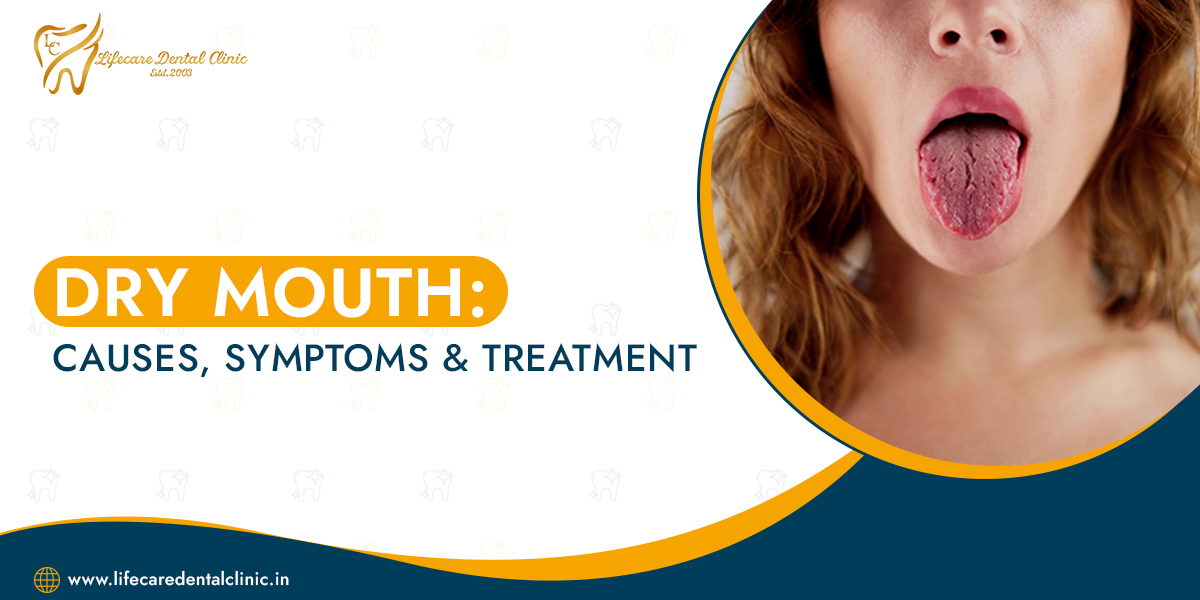Dry mouth, also known as xerostomia, is a common condition where the mouth feels dry due to a decrease in saliva production. Saliva is essential for keeping the mouth moist, helping with swallowing, speaking, and maintaining oral health. When saliva production is impaired, it can lead to discomfort and even contribute to various oral health problems. If you're experiencing dry mouth and are looking for relief or expert advice, finding a reliable dental clinic in Tricity could be your first step toward managing the condition. Let’s understand more.
Causes of Dry Mouth
Dry mouth can result from several different factors. Here are some of the most common causes:
1. Medication Side Effects
Many medications, especially those used for allergies, depression, high blood pressure, and anxiety, can cause dry mouth as a side effect. These medications can reduce the flow of saliva, making it harder to keep your mouth hydrated.
2. Aging
As we age, the production of saliva naturally decreases. Additionally, older adults are more likely to be on medications that contribute to dry mouth.
3. Dehydration
Not drinking enough water, excessive alcohol consumption, or prolonged illness with fever can cause dehydration, which leads to a dry mouth. Dehydration reduces the production of saliva, leaving the mouth feeling dry and uncomfortable.
4. Health Conditions
Certain health conditions like diabetes, autoimmune diseases and hormonal changes (like those during pregnancy or menopause) can interfere with the salivary glands, causing dry mouth.
5. Nerve Damage
Any trauma or surgery involving the head or neck area, particularly around the salivary glands, can lead to nerve damage that impairs saliva production.
6. Smoking and Tobacco Use
Smoking or using tobacco products can reduce saliva flow and worsen dry mouth. The chemicals in tobacco can affect the salivary glands, making it difficult for them to produce enough saliva.
7. Mouth Breathing
Breathing through the mouth, especially while sleeping, can dry out the mouth. This is particularly common among individuals with nasal congestion or sleep apnea.
Symptoms of Dry Mouth
The symptoms of xerostomia vary from person to person but often include:
Persistent dry feeling in the mouth
You may constantly feel thirsty or find it difficult to swallow, chew, or speak due to the lack of moisture.
Dry or sticky feeling in the throat and lips
When your mouth is dry, your lips and the inside of your throat may also feel parched, leading to discomfort.
Bad breath
A dry mouth can lead to the buildup of bacteria and food particles, causing bad breath (halitosis).
Difficulty swallowing and speaking
Without enough saliva to moisten the mouth, it becomes harder to swallow food or speak clearly.
Sore or cracked lips and mouth
The lack of moisture may lead to painful cracks at the corners of the mouth or sore gums.
Changes in taste
Saliva helps you taste food properly. When there isn’t enough saliva, your sense of taste may become altered, or you might have a persistent bad or metallic taste in your mouth.
Increased tooth decay and gum disease
Saliva plays a vital role in neutralizing acids, washing away food particles, and protecting against bacteria. Without sufficient saliva, your teeth and gums are more prone to decay and infections.
Treatment of Dry Mouth
If you're struggling with dry mouth, it's essential to seek the help of an expert dental team in Tricity where you get best treatment options tailored to your specific needs. Here are some treatments that can help alleviate the symptoms of dry mouth:
1. Hydration
One of the simplest and most effective ways to relieve dry mouth is by drinking plenty of water throughout the day. Keep a water bottle handy to sip on, especially in the morning and at night.
2. Saliva Substitutes
Over-the-counter saliva substitutes come in the form of sprays, gels, or lozenges. These products can help lubricate your mouth temporarily and make it easier to swallow and speak.
3. Good Oral Hygiene
Maintaining a clean mouth is crucial for preventing tooth decay and gum disease, especially when you have dry mouth. Brush your teeth at least twice a day with fluoride toothpaste, and floss daily to remove food particles and plaque. Using an alcohol-free mouthwash can also help keep your mouth fresh and hydrated.
4. Medications
In some cases, experts may recommend medications that stimulate saliva production. These include pilocarpine and cevimeline, which are typically prescribed for individuals with severe dry mouth caused by certain conditions.
5. Avoid Irritants
If you're prone to dry mouth, it's a good idea to avoid alcohol, caffeine, and tobacco, as they can worsen the condition. These substances can further dry out the mouth and exacerbate the discomfort.
6. Consulting with a Dentist
The expert dental team in Tricity at Lifecare Dental Clinic can assess your oral health and make personalized recommendations to manage dry mouth. This would also help with preventing oral issues such as cavities, gum disease, and bad breath, which are more common in individuals with dry mouth.
Conclusion
Dry mouth, or xerostomia, can significantly affect your quality of life, but the good news is that there are many treatment options available in Chandigarh Tricity to manage the condition. If you're experiencing dry mouth, don’t hesitate to reach out to the dental experts at Lifecare Dental Clinic in Tricity for a consultation. Call on +918591297780 or fill in your information here and we will help you get back to feeling comfortable and confident with a dry-mouth-free smile!


Leave A Reply